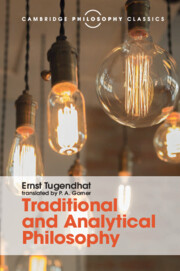Book contents
- Frontmatter
- Dedication
- Contents
- Preface
- Preface
- Translator's preface
- Part I Introduction: confrontation of analytical philosophy with traditional conceptions of philosophy
- 1 A question of method
- 2 A philosopher in search of a conception of philosophy
- 3 Ontology and semantics
- 4 Has formal semantics a fundamental question?
- 5 Consciousness and speech
- 6 The argument with the philosophy of consciousness continued
- 7 A practical conception of philosophy
- Part II A first step: analysis of the predicative sentence
- Bibliography
- Index of names
- Index of subjects
4 - Has formal semantics a fundamental question?
from Part I - Introduction: confrontation of analytical philosophy with traditional conceptions of philosophy
Published online by Cambridge University Press: 05 August 2016
- Frontmatter
- Dedication
- Contents
- Preface
- Preface
- Translator's preface
- Part I Introduction: confrontation of analytical philosophy with traditional conceptions of philosophy
- 1 A question of method
- 2 A philosopher in search of a conception of philosophy
- 3 Ontology and semantics
- 4 Has formal semantics a fundamental question?
- 5 Consciousness and speech
- 6 The argument with the philosophy of consciousness continued
- 7 A practical conception of philosophy
- Part II A first step: analysis of the predicative sentence
- Bibliography
- Index of names
- Index of subjects
Summary
Because Aristotle orientated himself not only towards the expression ‘being’ (Seiendes) but also towards the expression ‘is/to be’, traditional ontology reaches beyond a mere theory of objects or theory of substance. This surplus really already belongs to the broader field of a formal semantics. If one asks why Aristotle included predicative determinations as well as objects in his formal thematic the answer must be: because predicative determinations, although not objects, are at least determinations of objects. So the orientation towards the category of an object, which is definitive of the whole of traditional philosophy, also determined which non-objectual semantic form Aristotle dealt with.
If we now envisage a formal semantics as the formal universal science in place of ontology we must consider whether the formal thematic, as thus extended, still has some sort of unified structure and a centre, so that here too a unitary fundamental question can be formulated.
The fundamental question of ontology is: what is being as being? It is obvious that this formulation of the question is a makeshift solution, for it is framed as though one were asking about the what-being (Was-Sein) of an object. I have therefore reformulated it so that what is being asked is what it means to speak of an object (or being). This is already to give the question a semantic formulation. But its real semantic counterpart is the question: ‘How can one refer to objects with linguistic expressions?’ and this question, it would seem (cf. pp. 33–4), leads back to the question: ‘In what does the meaning of a singular term consist?’ And if we wish to avoid speaking of a meaning as an object, this question can be formulated as follows: ‘What is it to understand a singular term?’ Analogously, if we extend the sphere of the formal thematic beyond that of singular terms, we can ask with respect to any semantic class: ‘What is it to understand an expression of this form?’ The formulation ‘What is it to understand …?’ is not completely clear. But at the present stage of our deliberations it is appropriate to content ourselves with a question-formula which contains only a vague indication of what we are looking for. As yet we do not know with what categorial means we can adequately thematize something like the understanding of linguistic expressions.
- Type
- Chapter
- Information
- Traditional and Analytical PhilosophyLectures on the Philosophy of Language, pp. 36 - 50Publisher: Cambridge University PressPrint publication year: 2016



